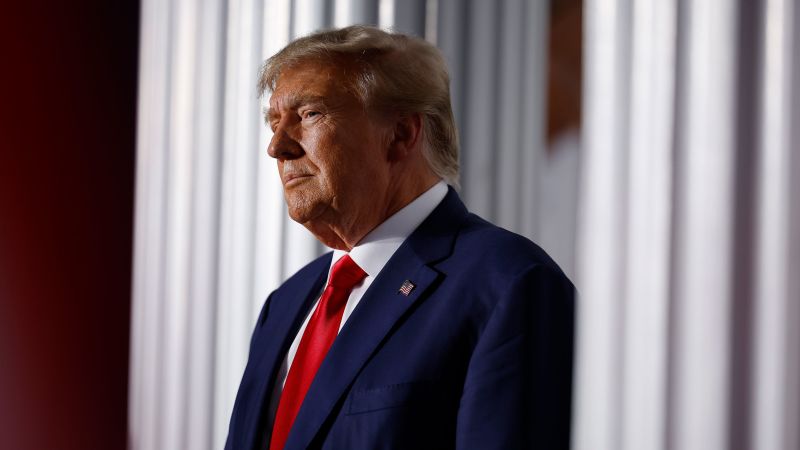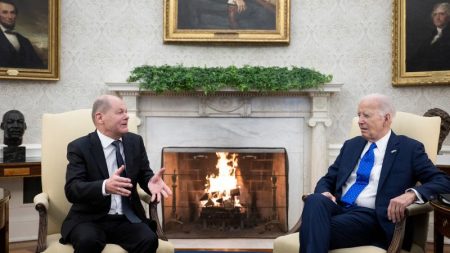A version of this story appeared in CNN’s What Matters newsletter. To get it in your inbox, sign up for free here.
As Donald Trump plots his criminal defense in the classified documents case, the GOP candidates looking to block his political redemption are slowly making political calculations.
In the simplest terms, the growing Republican primary field faces a basic question about the former president – would they pardon him if they were elected to the White House?
The answer, however, is tying some candidates into uncomfortable positions. Ultimately they must explain in very real terms to Republican voters why they are a better option than the twice-impeached and now twice-indicted former president. Maybe later.
Trump, meanwhile, is capitalizing on right-wing backlash to the federal charges, to which he pleaded not guilty earlier this week. He has raised more than $7 million in contributions since news of the indictment broke, according to his campaign – including more than $2 million from a fundraiser at his Bedminster, New Jersey, golf club hours after his arraignment.
And Trump still maintains a clear lead over his rivals. More than half, 53% of Republican and Republican-leaning voters, support Trump compared to 23% for his closest rival, Florida Gov. Ron DeSantis, according to a Quinnipiac University poll that was conducted from June 8 (the day news broke of Trump’s indictment) through June 12. In an ABC News/Ipsos poll fielded after the indictment, more than 60% of Americans thought the charges were serious, but only 38% of Republicans felt the same way.
Trump’s post-indictment power among Republicans shows just how much his base has bought into his narrative that he’s the victim of political persecution and the charges are “election interference” from the Biden administration Justice Department.
However, it’s only been a week since news of indictment, and it’s still very early in the primary. There’s plenty of time for things to change – and for GOP rivals’ messages to evolve.
At the same time, more Republicans keep getting in – raising the prospect that a splintered field could benefit Trump, allowing him to win with a plurality as he did in 2016. Miami Mayor Francis Suarez entered the race on Thursday, offering himself as a fresh face for the GOP. It remains to be seen, however, whether a party so consumed with its past leader is open to someone new.
None of the Republicans who are running against Trump are exactly defending his retention of classified documents in the bathroom at Mar-a-Lago.
“If this indictment is true, President Trump was incredibly reckless with our national security,” said former South Carolina Gov. Nikki Haley during an appearance on Fox News on Tuesday.
“Very bad judgment, no doubt about it,” entrepreneur Vivek Ramaswamy said of the allegations on CNN’s “State of the Union” last Sunday.
But then Ramaswamy doubled down on his pledge to pardon Trump and dared other candidates to do the same.
Haley is interested, arguing during a radio interview that a pardon is “less about guilt and more about what’s good for the country.”
“I think it would be terrible for the country to have a former president in prison for years because of a documents case,” she said on “The Clay Travis and Buck Sexton Show,” which has been asking all the candidates the pardon question. “So, I would be inclined in favor of a pardon.”
Former Vice President Mike Pence, talking to the same radio show, is among the Republicans who don’t appear ready to commit one way or the other on a pardon.
“We either believe in our judicial process in this country or we don’t,” he said. “We either stand by the rule of law, or we don’t.”
DeSantis, who has fallen in recent polling, but remains closest to Trump, has stayed noticeably quiet, although he said during an event in North Carolina that as a military lawyer he would have faced court martial “in a New York minute” for taking classified documents.
DeSantis’ previous comments suggest the governor could very much get on board with pardoning Trump. He said he would be aggressive in considering pardons for January 6, 2021, rioters and he has described the idea that the Justice Department should be treated as a nonpartisan organization as a “fallacy.”
Former Arkansas Gov. Asa Hutchinson, who barely registers in polling, is taking a critical approach more in line with former New Jersey Gov. Chris Christie, who has anointed himself as Trump’s Republican primary prosecutor.
“It’s offensive to me that anyone would be holding out a pardon under these circumstances,” he said on “State of the Union.”
In a time when Republican lawmakers in the US House are calling to defund the FBI, Hutchinson has a decidedly old school, as in pre-Trump, view of the justice system.
“The Republican Party stands for the rule of law and our system of justice,” he said, perhaps referencing the many loud calls by Republicans to cut funding for the FBI and go after Attorney General Merrick Garland. “Let’s not undermine that by our rhetoric, by making up facts, and by accusing the Department of Justice of things that there’s no evidence of.”
“Let’s build confidence in our institutions of democracy and justice, and not undermine those.”
But South Carolina Sen. Tim Scott said the indictment itself is undercutting confidence in institutions – which is a viewpoint much more reflective of the Trump-era GOP.
“We don’t survive if the majority of Americans don’t trust their justice system,” Scott said during a campaign appearance in Iowa, according to the Des Moines Register. About half of Americans in the ABC poll say they see the charges against Trump as politically motivated (47%), while 37% do not and 16% say they aren’t sure. Republicans overwhelmingly view the charges as political (80% say so), while most Democrats (71%) say they were not politically motivated.
For an idea of how thoroughly Trump’s views have overtaken the party, note that the Republicans he beat in 2016 who are still in office are now some of his loudest defenders.
“The damage this is already inflicting far outweighs the damage from what they allege in the indictment,” Florida Sen. Marco Rubio, the vice chairman of the Senate Intelligence Committee, said in a tweet.
CNN’s Dana Bash asked one of Rubio’s top aides from his 2016 campaign about that thinking.
“It’s being framed in conservative media as the Biden Justice Department versus Donald Trump, the former Republican president,” Alex Conant said.
“And that put candidates in an awkward situation, because they are either siding with the Biden administration or Trump,” he added.
Conant said Pence’s wait-and-see approach is the right call for a candidate, because it allows them to see what happens at trial.
“This is going to play out over the course of many, many months,” Conant said. “There’s going to be other opportunities to head on head with the president (Trump).”
But ultimately, these candidates must turn and make their case, David Kochel, a former senior strategist for the Jeb Bush 2016 campaign, told Bash.
“A campaign is a competition, and you need to be able to say why you’d be better and why Trump is flawed. Why he shouldn’t be president again,” Kochel said.
At some point these candidates will have to more effectively do that.
That argument against Trump could eventually be focused more on electability than classified documents.
“Republicans have fared poorly when he was at the top of the ticket,” Conant said. “That’s a clear message for Republican candidates to be leaning into.”
Read the full article here













